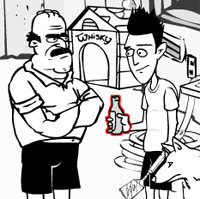

If the dealer chooses to trade cards and receives one of the same rank from the top of the deck, they immediately wins the hand and all other players lose one chip.The king is the lowest as it is the best card in the deck, regardless of value. The order, from high to low, would be A Q J 10 9 8 7 6 5 4 3 2 K. Sometimes the object is to avoid having the highest card in the deck.A player who runs out of chips may be allowed to remain in the game, but is eliminated upon losing one more hand.Counters are not used and the player with the lowest card at the end of each round is immediately eliminated from the game.If the player who is forced to exchange gives an ace or deuce (2), they announce it aloud, but the player who initiated the exchange says nothing (as the initiator's card may be passed on).The dealer is not allowed to exchange with the deck if the top card is a king.When exchanging the dealer may cut the deck and then turn up the top card.Players stuck with an ace have to pay double.If two or more groups pair up in a single hand, higher pairs beat lower ones, triples beat pairs, and quartets beat triples. For example, in a four-player game, two players holding sixes would outrank one opponent with a king and another with a queen the queen is now the low card and must give up one chip. Players holding cards of the same value are considered to have "paired up," and their combined cards outrank any single card regardless of its value.However, if the last two players both lose their final chips in a tie, the game has no winner the money remains in the pot, and all players make a further bet and start a new game. Players who lose all their chips are out of the game the last remaining player wins and collects all the money in the pot. The dealer rotates one position clockwise around the table for each new hand. If two or more players tie for lowest card, they each lose one chip, except in variants that include "pairing up". Play proceeds clockwise around the table, with the dealer playing last instead of trading cards with someone else, though, the dealer may exchange his or her card for the top one from the deck.Īfter all players have taken a turn, they turn their cards face-up and the one with the lowest-valued card loses one chip. Any player who shows a top-value card in this manner is considered to have finished for that hand.

However, if the intended recipient is holding a card of the highest value (depending on which set of rankings is being used), the recipient turns that card face-up and the trade is nullified. After examining this card, a player may either keep it or exchange it with the player on the left. Each player is dealt one card face-down, after which play begins with the player to the left of the dealer. When the game is played for money, all players contribute the same amount to a central pot. Įach player starts the game with the same number of chips or counters, usually two to four. The goal in each hand is to avoid ending up with a lower-valued card than any other player. Play Īny number of players may participate, using a standard deck of 52 cards without jokers. Wee, wee!" The same description appears in the West Cornwall Glossary of 1880. Now at a table, and called Miss Joan." This is followed by the lines "Here's a card, as you may see! Here's another as good as he! Here's the best of all the three And here's Miss Joan, come tickle me. For example, in 1879 in a publication by the English Dialect Society it is described as "an old-fashioned game of cards, marked with chalk upon a bellows or tea-tray. Ĭonfusingly, at about the same time the name Ranter-Go-Round appears in the literature associated with the different game of Snip, Snap, Snorem. There are no cards with special privileges.

refuse to exchange if they believe they have a card high enough not to lose. An 1882 account describes Ranter Go Round as "a first-rate game for a winter evening." Players have three lives in the form of counters, receive one card each and exchange with their left-hand neighbours, the dealer exchanging with the stock. The game "is said to have been first played in Cornwall," however Cuckoo has been played in Europe since at least the 17th century, often with special cards. Ranter Go Round is described as early as 1881.


 0 kommentar(er)
0 kommentar(er)
